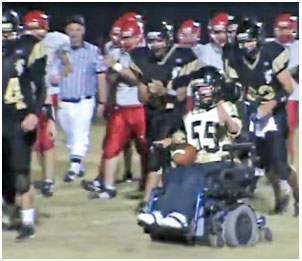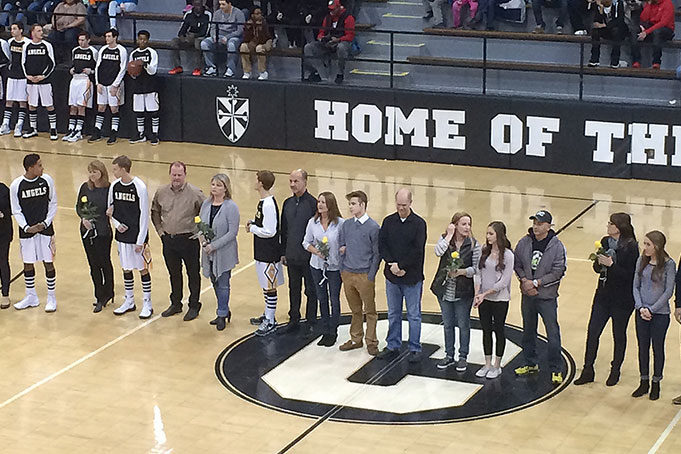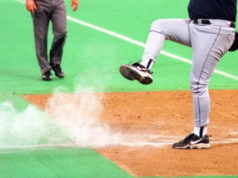If you work long enough most officials will find themselves in the middle of special circumstances that go beyond any rulebook.
It’s a cold December evening but the gym is packed to see Northside High take on Westview. Midway through the third quarter the home fans get what they came to see when Northside’s Ryan Hunter knocks down a three-pointer from the right wing to give him 1,000 points for his career. Immediately the buzzer sounds, and the game comes to a halt while the achievement is celebrated with photographs and the presentation of a plaque and the game ball.
The festivities last a little less than five minutes, during which the Northside players are celebrating with their teammate. Meanwhile, their opponents are anxious to get the game restarted and build on their eight-point lead.
What role do the officials have in all this? While officials are charged with administering a contest according to the rules, it is not uncommon to find themselves caught up in the pomp and pageantry of sports.
The scenario described occurs in gyms across the nation throughout the basketball season. There is no reason a 1,000-point ceremony should create a problem for officials, but it is helpful if the crew knows ahead of time what might be coming. It is rare for schools not to know when such an event is imminent, and it is helpful for the school involved to touch base with its opponent and the officials.
Shane Bacon has officiated high school and college basketball for some three decades and has also coached the sport.A resident of Hermon, Maine, near Bangor, he spends much of his time in New York state, where he officiates harness racing as a judge for the New York State Gaming Commission.
Sooner or later, everyone who officiates will find themselves dealing with situations that are unique.
Bacon notes that stoppages to celebrate historic achievements are usually brief, seldom lasting more than a few minutes, and rarely cause issues for the participants or officials. “We have a general idea of how long (the celebration) is going to take,” he says. “We’ve seen it before. If I were an opposing coach I’d feel like a jerk if I said, ‘I really don’t want that to happen.”
Melissa Mertz, an associate executive director of the Pennsylvania Interscholastic Athletic Association, notes the organization encourages the recognition of outstanding achievements, such as scoring milestones. “We certainly want to credit that individual for that accomplishment,” Mertz says, “as long as it doesn’t unnecessarily delay the game. We tell our officials to apply common sense. We really haven’t had any problems with those situations.”
Two-Way Communication
Bacon believes good communication is essential if something out of the ordinary is on the evening’s agenda. “I don’t think I’d like it if nobody informed me that this might happen tonight,” he says, “and if it does, this is going to happen. Just making me aware of it. I think that’s a courtesy, I think that’s a good practice.
Bacon notes that embracing the recognition of outstanding achievements encourages and promotes good sportsmanship. “That’s kind of what this is all about,” he points out. “It’s what we’re doing as a group, (promoting) sportsmanship and recognizing someone for achieving something.”
Mike Carr has a unique perspective. He’s officiated football for more than two decades and is currently in his fifth season in the Big Ten; he moved to center judge this season after spending his first four as a head linesman.
Carr is also the athletic director at Oregon (Wis.) High School, where on game nights he must consider the interests of an assortment of constituencies, including the competing teams, the representatives of the visiting school, the officials and, depending on the season, the bands, cheerleaders and other organizations. Carr tries to make it a point to get the word out as early as possible about special events on the schedule, particularly during the football season when, on game nights there are, as he puts it, “a lot of moving parts.”
“You’re dealing with people,” Carr points out. “Your best-laid plan is you’re going to get the cheer team on and you’re going to get the pom team done and the band is going to play, and you hope to get it done within the time that you’ve allotted. Well, when you deal with people, things are going to happen and sometimes things go a little bit longer than they should.”
Carr notes that the lines of communication between the host school and the officials ideally should work in both directions. “If officials haven’t heard from the host AD in the first couple days of the week, they should reach out,” he says.
Disabled Student Finally Gets the Ball
 Dylan Galloway was born with cerebral palsy and has been confined to a wheelchair for his whole life, yet he never gave up on his dream of scoring a high school touchdown.
Dylan Galloway was born with cerebral palsy and has been confined to a wheelchair for his whole life, yet he never gave up on his dream of scoring a high school touchdown.
In October 2010 that became a reality when the then-Manila (Ark.) High School senior wheeled into the end zone with less than five minutes remaining in a game against Rivercrest (Ark.) High. Trailing, 47-0, Manila and Rivercrest coaches got together and set up a play where Galloway could get the ball in his wheelchair from the four yardline.
“He had been after me all year in the hall, at lunchtime and during the school day,” said Manila coach Toby Doke. “He kept telling me he wanted to score a touchdown.”
Galloway has always been passionate about the sport.
“I called coach (Kelly) Chandler down at Rivercrest and he agreed to let it happen. We were about to score and we were going to try to do it on the last play of the game, but the mercy rule was in effect and the clock was running so I felt like it was as good of a time as any to do it right then,” Doke said. “We put a football helmet on Dylan, and I told him to get his butt in there and go score a touchdown, and he wheeled out into the middle of the field. Our quarterback got him lined up and handed him the ball, and he went around the left side and went into the end zone. It was a very special moment.”
Be Flexible
The NFHS football rulebook specifies that halftime may last 15 minutes (with a maximum length of 20 minutes), plus a mandatory three minute warmup. Theoretically a team could be penalized for delaying the start of either half, but Carr is quick to note that officials who believe in strict adherence to the text of the rulebook in special situations are likely to have a very short career.
“We all know as officials that if you hang your hat on, ‘That’s the rule,’ you’re not going to officiate very well for very long,” he says.
In Texas, high school football is played under NCAA rules. The University Interscholastic League allows a 28-minute halftime, during which the bands of both schools perform. Each band is allocated 14 minutes.
Mike Fitch is the executive director of the Texas Association of Sports Officials. The organization’s 14,000-plus members work contests statewide in six different sports — football basketball, baseball, soccer, softball and volleyball.
“What we tell our officials is, ‘Use a little common sense,’” he says. “You’re certainly not going to go out there and chase a band off the field. If (halftime) goes more than 28 minutes, our officials are directed to file an incident report that goes directly to the University Interscholastic League.”
Carr says it is important that the host school communicates with the officials about any changes to the agenda. Often such changes are of the last-minute variety.
“Communication is key,” he says, “whether it’s from the AD to the officials or when the officials come to the gym or field and ask, ‘Is there anything going on tonight?’ There might be a time when an athletic director doesn’t know a student-athlete is hoping to break the goals-scored record tonight because he just found out about it himself from the coach 10 minutes before the game started … I think it’s beneficial for officials to sometimes ask that question or initiate that conversation.”
There are rare occasions when officials can best impact a game by intruding on it as little as possible. That was certainly the case Nov. 2, 2014, when Lauren Hill took the floor with her Mount St. Joseph University teammates to open the new basketball season against Hiram College. Hill was suffering from terminal brain cancer and the coaching staffs of the two schools had prearranged for her to score an uncontested layup on the first play of the game, which she did.
“The game was not about the officials. The game was about bringing awareness to the type of cancer Lauren had and bringing attention to sports bringing people together.”
The three officials, referee Linda Miles and her partners Jon Hershberger and Matt Barker, were aware of Hill’s medical status and also of the game’s scripted start. Miles, a former collegiate player who has worked college games the past five seasons, recalls the occasion as one where the officials needed simply to “stay out of the way.”
“The game was not about the officials,” she says. “The game was about bringing awareness to the type of cancer Lauren had and bringing attention to sports bringing people together.”
Following the opening sequence, the game continued in normal fashion; in fact, Hill scored an unscripted basket in the closing seconds. The officials worked the game as they normally would.
Miles says she and her crewmates took the right approach to an event that transcended the game. “It wasn’t about the game,” she says. “It was about the moment they wanted to have for Lauren and help her achieve her dream. Our job was to go out there and assist in that moment.
“There was a timeout where Lauren was recognized, and the game ball was given to her. Our job was to stay out of the way and communicate as a crew so we were in tune to what we needed to do afterward so we could proceed on with the game. But let that moment happen.”
Beware of Liability
Attorney Alan Goldberger, an expert on liability issues pertaining to the officiating industry, says that type of arrangement theoretically does not increase an official’s liability exposure.
“As long as the way they have things set up doesn’t unreasonably increase anybody’s risk of injury, I think it’s a good idea to play along,” he says. “I think the legal exposure is minimal.”
But Goldberger says that officials must always be wary of potential liability issues and see to it that proper safety protocols are followed.
If two football teams have agreed to let a player score a touchdown, for instance, the officials should have a clear understanding of what is to occur and be alert in case a player decides he doesn’t want to “go along with the program.”
“You have an athlete who is going to go into the game at a predetermined time and score a touchdown or intercept a pass,” Goldberger says. “That’s fine. If the kid is going to score the touchdown, have him score the touchdown, but don’t have anybody tackling him.
“And then of course he or she should have proper equipment on. Even though they’re going to run unimpeded 10 yards down the football field they ought to have a football helmet on and shoulder pads. I think you have to make allowances for that sort of thing. But you don’t want to be part of anything outlandish or dangerous.”
Officials must be particularly wary if an athlete has a disability. The Americans With Disabilities Act from participation because of their disability but that by itself does not absolve officials of liability in the event of an injury.
In some sports, an athlete may compete with a prosthetic limb designed specifically for that sport. In that circumstance the official must check to be sure the artificial limb does not provide an unfair advantage. An artificial limb designed for swimming for instance cannot be shaped like the fins a scuba diver would use. In virtually every case the prosthesis has been approved beforehand by the state athletic association or other governing body.
“The general rule we follow is we’re fine with the situation if it doesn’t fundamentally alter the basic rules of the game or the basic integrity of the game,” Mertz says. “We have provisions for wheelchair athletes for track and things like that.”
Legalities aside, Carr says officials should use common sense and people skills to find workable solutions to situations involving disabled athletes. “As an administrator I get to see how hard those kids work,” he says, “and how connected they are to their teammates. How their teammates lift them up and they lift their teammates up. I think every school probably has a story like that. Officials I think don’t see that because (they are) just kind of in and out but (that student) could be your daughter, it could be your niece, it could be your sister.
“I think if officials can put themselves in that position sometimes with the empathy that maybe that situation deserves instead of relying on ‘That’s the rule.’ Just calling fair-foul or ball-strike; there’s more to officiating than that.
Special Requests
On occasion, officials are asked to take on responsibilities they do not necessarily want and certainly did not seek out. The task may be as seemingly innocuous as officiating a home run-hitting contest, monitoring a passing competition at halftime of a bowl game or, at lower levels, working a “B” game before or after a varsity contest at the request of an athletic director who is shorthanded.
Goldberger notes that in some cases, the “extra duty” may be a condition of the game assignment per agreement with a corporate sponsor or television network. In that scenario the official may not have the option to refuse. “If this is what you’re contracted to do, you may not have much choice,” Goldberger says. “In addition, the official may be hurting his standing with an assigner or coordinator if he balks at extra duty.”
Fitch believes that in most circumstances, officials are better off avoiding extraneous events and contests. “If it was a special event like an all-star game that really had no bearing on final outcomes or playoffs, we would say that’s OK,” he says. “If it’s a regular game, no. That’s not part of their duties.”
Ideally, the official will get details about any special requests or responsibilities well in advance of the assignment and will have a clear understanding of what is expected. In any case, they should be aware of any safety-liability concerns and be sure those concerns are addressed.
In his role as athletic director, Carr will ask his freshman volleyball officials to do double duty; that is, work the freshman match and then stay to call the lines for the varsity match that follows. For doing so they receive additional compensation.
“If those officials agree to do that, we’re going to put that in a contract and pay them a fair fee,” he says. “I don’t expect officials to do things for us for nothing.”
Sooner or later, everyone who officiates will find themselves dealing with situations that are unique; moments that aren’t necessarily addressed in the rulebook, casebook or mechanics manual, situations that call for mature judgment and sound people management skills.
Carr says his day job has given him a fresh perspective on the subject. We do everything based on what’s best for kids,” he says. “And if you view the situation through that lens, what’s best for kids, within the spirit and intent of the rules, I think that’s a good guiding post.”
What's Your Call? Leave a Comment:
Note: This article is archival in nature. Rules, interpretations, mechanics, philosophies and other information may or may not be correct for the current year.
This article is the copyright of ©Referee Enterprises, Inc., and may not be republished in whole or in part online, in print or in any capacity without expressed written permission from Referee. The article is made available for educational use by individuals.



















